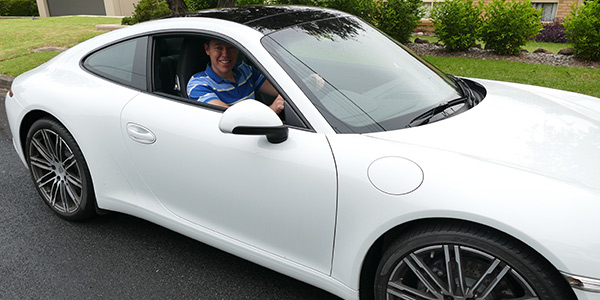If you are involved in trading Contracts for Difference (CFDs), and you read the papers, then you would have come across some CFD articles suggesting that trading CFDs is just like gambling.
In this article, we’ll take a look at the reasons behind such a damning reference and explain clearly how to ‘remove the gambling’ in your CFD trading.
Click play on the video below.
When people think of gambling, visions of Las Vegas, roulette tables and the rich and famous come to mind.
Next, you have the horse races and events like the Melbourne Cup which stops the nation, and over $250 Million is invested (aka gambled) on this one race alone.
Yes, Australian’s love to gamble. Recent reports indicate that 80% of Australian’s gamble, which represents the highest rate of gamblers per capita in the world.
Australia also wins the title for the most poker machines per capita in the world. We sure are off to a flying start, aren’t we?

For many years seminar spruikers have indicated Australian’s are the largest owners of shares per capita in the world and most recently CFDs have exploded on our market.
It seems to be true, Australian’s love shares and have taken to CFDs like Tiger Woods to the fairways and back surgery.
Time to trade your Holden for a Porsche
The people who suggest trading CFDs is like gambling, usually come from a history of long-term stock investing where solid blue chip companies paying attractive dividends rule the portfolio.
Many traders would suggest going from trading stocks to trading CFDs is like trading in your Holden Barina for a twin turbo Porsche 911.

If you are an inexperienced driver, then jumping behind the wheel of a high-performance car could be deadly. Just like those trading CFDs with little to no experience.
More recently, many Australian blue chip stocks have been heading south.
So can we even be safe investing in solid blue chip companies like National Australia Bank, AMP or ANZ bank?
Here is a chart of National Australia Bank (NAB:ASX) as of 23 June 2017
Here is a chart of AMP (AMP:ASX) as of 23 June 2017
Many Self-managed super funds and accounts of investors are holding Blue chips stocks like AMP. AMP is down 25% from January 2015 to June 2017.
Calling the buy and hold strategy gambling would be a massive mistake on my behalf. Because without knowing the time frame or risk tolerance of the investor would mean I’m just making a huge generalised statement.
So too with CFDs. You cannot call CFD trading gambling without knowing how the product can be used. Or taking into account the trader or investors’ time frame and risk tolerance.
Otherwise, you are making another grossly exaggerated generalised statement.
First and foremost the biggest offender is the fact you can lose more than what you start with when trading CFDs.
For example, you might have $5,000 in your CFD account, but your CFD Leverage will allow you to trade $100,000+ worth of blue chip shares like BHP.
If BHP falls 6% in a couple of days or perhaps even in one day as it did in January 2008 (gapped over 6% overnight), then you would have lost around $6,000.
Even since January 2017, BHP on the ASX is down 19.5% with what technical analysts would call a short-medium term downtrend.
Considering you only have $5,000 in your account, you now face a small problem.
You’ve just wiped out your trading account and now owe $1,000!
So not only are CFDs dangerous in the wrong hands but it’s worse than gambling because you can, in fact, lose more than what you start with.
At least when you journey off in your finest suit or beautiful dress to the race track, the most you can lose is the money you start with.
So yes, when people trade Contracts for Difference (CFDs) with reckless abandon and don’t take into consideration how to effectively use their CFD leverage, then problems can arise.
This is when CFDs assume a gambling like nature.
Having said that, those who can control their CFD leverage, understand appropriate risk management and use stop losses religiously, seem to have advantages that go far beyond your standard stock trading.
You see, not all CFD traders are gamblers. Sure, when they first hit the scene, there might have been some newbie traders who got carried away.
But fortunately, many of those reckless traders have left the game, still licking their wounds.
I say fortunately because they lost control of their leverage and paid the price. Now they are no longer in the game, giving it a bad rap.
CFD traders need to take responsibility for their actions. CFD traders need to treat their trading like a business and build a sensible trading plan.
If you want to be a CFD trader but need help in building a sensible trading plan, then check out the best trading books in 2017 to get you started.
How to make 30% returns without breaking the bank
Let’s say you have backtested your trading system and it returns 10% per annum with no leverage.
Not exactly an incredible trading system and certainly won’t win you portfolio manager of the year.
What happens if you then trade your system at three times leverage?
This means if you start with $10,000 cash in your CFD account, your total positions do not exceed $30,000 in total.
You then continue trading your 10% return per annum system. If all goes well, you would have achieved a return of around 30% on your cash.
Of course, this is just a hypothetical example. You must keep in mind your risk level will also triple in the above-mentioned scenario.
You just made 10% on $30,000 which is a 30% return on your cash outlay of $10,000.
So the real trick to trading Contracts for Difference (CFDs) is controlling your leverage. Also, you must understand your CFD Risks implicitly.
In fact, it is sensible to trade CFDs with little to no leverage. Especially while you are finding your ‘feet’ in the market.
So before you put down the deposit on that Princess motor yacht, start very small. Trade well within your limits.
Any investment carries risk, but CFD traders and investors understand risk is essential to earn a reward for their efforts.
Overcoming Fear and Greed
Countless Trading books have been written on overcoming the psychological aspect of trading the markets.
Overcoming Fear and Greed are by far the most important elements to long-term success. Greed alone is usually what drives people to gamble when trading Contracts for Difference.
Greed in CFDs is disastrous and can have the potential to wipe out your trading account.
But then again, greed in most financial instruments will cripple your long-term wealth creation plans.
The problem with CFDs is the easy access to trading brokers and their platforms either online, over the phone or through your mobile phone.
Couple this with the incredible leverage you get access to (from 10 to 500 times your starting balance), and you can see why greed can be the silent and willing killer to any trading account.
This is why you must learn how to trade CFDs online before you jump in and start placing $50,000 trades.
If you are right at the beginning of learning how to trade CFDs online, then open a demo account. You will get $50,000 in practice money, allowing you to test your systems.
“Contracts for Difference (CFDs), Forex, Options or Futures are a financial product and
it is how the trader uses them that makes them risky or not.”
Having watched many traders succumb to the greed of high returns through trading, it has become clear that controlling the amount of leverage you trade with in your CFD account is paramount.
The risk is very closely correlated to return. So play it safe and keep the leverage on your CFD Trading to a minimum, trade your system confidently and enjoy a long and rewarding association with trading Contracts for Difference.
Trade Smart.